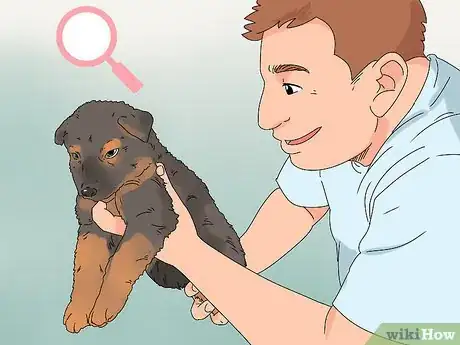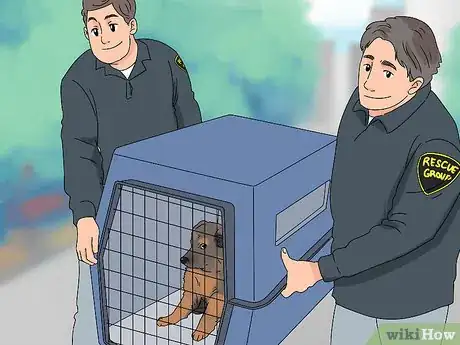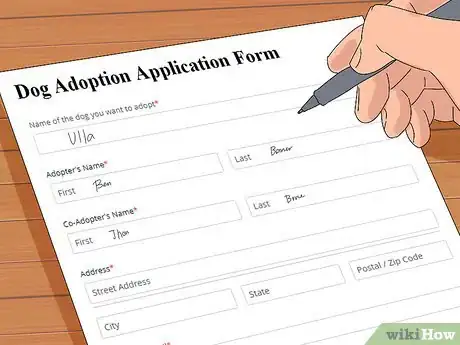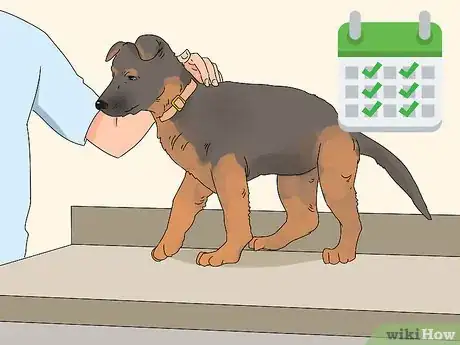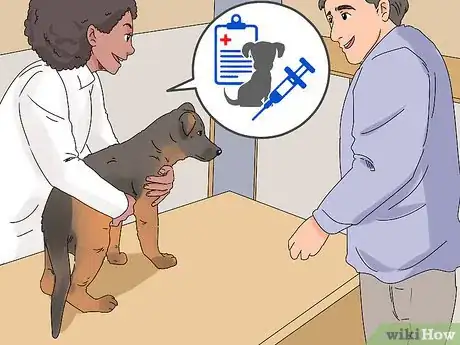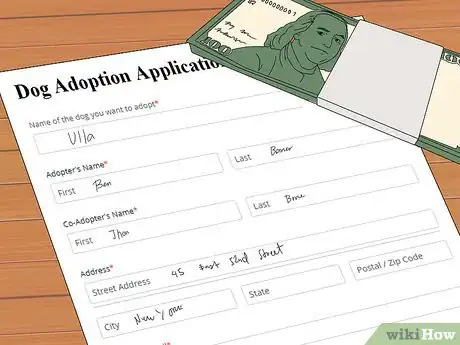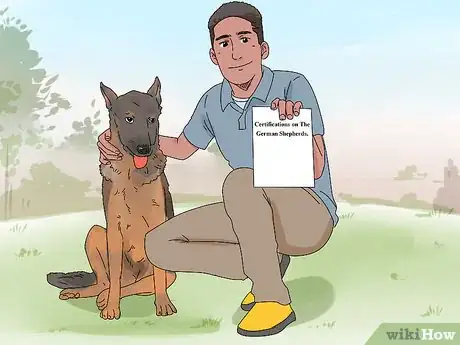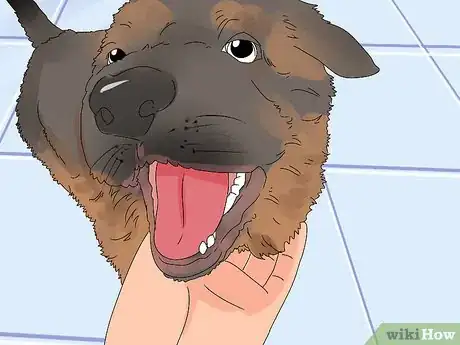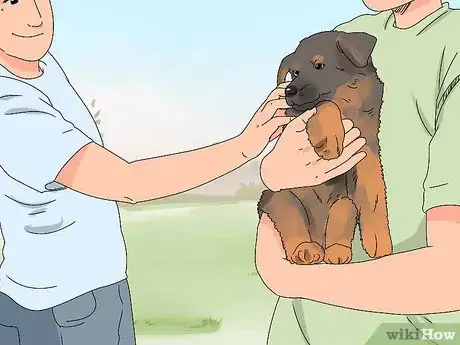This article was co-authored by Sheri Williams. Sheri Williams is a Certified Dog Trainer and Behaviorist and the Owner of sheriwilliams.com, a business that specializes in teaching veterans how to turn their dogs into service dogs or emotional support animals to assist with PTSD. Based in the Los Angeles, California metro area, Sheri has over 20 years of dog training experience and also runs a general dog training practice specializing in rehabilitating dogs through positive reinforcement training techniques. She is certified by The Animal Behavior and Training Association.
This article has been viewed 75,672 times.
German Shepherds, originally bred from a line of herding and farm dogs in Germany, are very popular working dogs, companions and protectors.[1] They are playful, fun-loving, full of energy, and, when properly socialized, German Shepherds love children. It you buy a German Shepherd and care for it well, you will have a faithful family pet, wonderful guard dog, and loyal companion for years to come.
Steps
Preparing to Buy a German Shepherd Puppy
-
1Prepare your budget. The cost of a dog does not just include the price you pay up front. You will need to consider whether you can afford normal daily costs, such as food, training, and long term expenses, such as vet bills. Be sure that you can work the cost into your budget comfortably before buying a puppy.[2]
-
2Pick the right time. Settling your new puppy into your home and teaching it the ways of the world will take a lot of your time and patience. If you have a really busy schedule or a lot of travel coming up, you may want to wait until you have a lot of time to concentrate on your new puppy.
- Taking the time to properly train a puppy will pay off in the future. A properly trained dog is a joy to have in your family, while a dog that is not trained could cause a lot of conflict and problems for years to come.
Advertisement -
3Prepare your home. You will need to puppy-proof your home before you bring home your new bundle of joy. Make sure random items you don't want destroyed are put away and that all hazards are out of reach of the pup.
- Pick a place in your home that will be all theirs for the near future. Don't let your puppy have the run of the place, instead give it a smaller space to adjust to before introducing it to the larger space. This will make the puppy's transition easier.[3]
-
4Research the breed. German Shepherds are a great dog breed for active people who want to spend a lot of time with their dog. They are herding dogs, which means that they have a deep seated need to work, even if that means attempting to herd you! You will need to give your dog something to do, exercising its mind and its body a lot of the time.[4]
- Also be sure that you have met a full grown German Shepherd before you adopt a puppy. You want to make sure that you like the temperament of the breed and that a full-grown dog will be a good fit with your family's lifestyle.
Adopt a German Shepherd from a Rescue Group
-
1Get a referral to a rescue group. Check with local veterinarians' offices, animal shelters, pet supply stores, and other area pet business for referrals to dog rescue organizations in your area.
- Contact one local dog rescue group for referral to other area groups. Some dog rescue groups work with all dogs, while others are breed-specific. Most rescues groups have established networks with other area rescues.
- You can also visit the American German Shepherd Rescue Association website for referrals to German Shepherd rescue groups in your state or contact the American Kennel Club for referrals to German Shepherd Rescue Groups. The organization's website also provides links to rescue organizations.
-
2Let the rescue group know that you are looking for a German shepherd puppy. Although the majority of dogs looking for new homes through rescue groups are adults, sometimes rescue groups have puppies to place.
- Most German Shepherds looking for homes through rescue groups do not have papers. If registering your puppy is important, or if you intend to enter it into competitions, you will need its title papers and health records, so a rescued dog may not be right for you.
-
3Fill out an adoption application. Many dog rescues will require a thorough application process in order to assure that you will be a good fit for the dog. Be prepared to disclose your address and whether you own your home, as well as your employment status and your philosophy when it comes to raising a dog.
-
4Meet a prospective puppy several times before adopting it. You will want to make sure that the dog's temperament works well with you and your family.[5]
- Ask whether you can get the dog checked out by your veterinarian. You will want your vet to check the dog's general health and for serious conditions, such as heart murmurs.
-
5Get as much of the dog's history as possible. Be sure to ask about the dog's health while the rescue has had it and if it is up to date on shots and healthcare. A good rescue should actually offer this information upfront.[6]
- Get a history of the dog's healthcare up to that point. Has it had its first vaccination, had heart worm treatment, and parasite control? These should have all been done before the age when a puppy is adoptable.
- While many rescue organizations cannot tell you much about the dogs they place, because the dogs have been rescued off the street or they have been given up anonymously, sometimes they have a bit of information. Get all the information you can about the dog's past so that you can assess their general background and health.
-
6Expect to pay the rescue group for the adoption. Dog rescue organizations are usually run on a shoe-string budget. While they depend mostly on volunteers, they do need funds to transport and care for dogs. Your adoption fee will most likely help to pay for the rescue of other dogs in the future.
Buy a German Shepherd Puppy From a Breeder
-
1Locate a reputable German Shepherd breeder in your area. Talk to others who own German Shepherds. Visit area dog parks, dog shows, and other places in your area where people gather with their dogs. Ask if they bought their dog from a breeder and if they were happy with the experience.
- Check the American German Shepherd Rescue Association and the American Kennel Club websites for German shepherd breeder referrals nationwide.
-
2Visit potential breeders in person. It is a good idea to visit several breeders before deciding which you want to buy your puppy from.
-
3Ask the breeders questions about the puppies and the mother. You want to determine how knowledgeable they are about the German shepherd breed and how well they take care of their dogs.[7]
- Look for breeders who participate with their dogs in activities that demonstrate the dogs' abilities. Such activities include Schutzhund, the working breed test for German Shepherds, and dog shows.
-
4Choose a breeder who keeps the litter inside of his home or someplace where they receive regular interaction with people. Avoid breeders who keep the dogs in cages away from people and have multiple litters at the same time. These puppies often do not receive the early stimulation necessary for development.
-
5Choose a breeder who has completed all the necessary health testing and certifications on the German Shepherds. This includes certification that the dogs do not carry a predisposition for hip or elbow dysplasia, eye disorders, cardiac disease, or Von Willebrand's disease (or VWD).
-
6Visit with any puppies available for sale. Although some breeders do sell puppies on the Internet, you should always visit the breeder in person and see the puppy before deciding to buy it.
- If a litter is not currently available, ask if you can visit with a breeder's adult dogs. Notice the adult dogs' physical appearance. The size, build and coloring of the breeding pair is a good indication of how future puppies will look. An adult male German shepherd should stand 24 to 26 inches (60 to 66 cm) at the top of his shoulder blades. A female should stand 22 to 24 inches (55 to 60 cm). If you like what you see and feel comfortable with the breeder, request to be contacted when a litter is being offered for sale.
- Pay attention to the cleanliness of the area where the dogs are kept. The dogs' space should be free or feces and urine, and fresh water should be available.
Pick the Right Puppy For You
-
1Look for a puppy that demonstrates the qualities desirable in the German Shepherd breed. Don't just pick the cutest puppy of a litter. Check the puppy's temperament before adopting it. German Shepherds are prized for their aloofness, patience and independence.
- A German Shepherd puppy should be approachable, quietly stay where it is, and show its willingness to meet you with body language, like tail wagging.
- Try putting it on its back gently. The puppy should resist a bit but not aggressively.
-
2Play with a puppy that you are considering adopting. Do they have the spirit and personality that you are looking for? Are they overly hyper or way to shy? These qualities can last into adulthood.
- If you're unable to play with the puppy in person, ask the breeder to send you videos of the puppy interacting with people or other dogs. This should be able to give you a better idea of the puppy's personality and temperament.[8]
-
3Introduce the puppy to every member of your household before buying it, if possible. Although German Shepherds tend to bond most strongly with one owner, they can also form close personal relationships with each member of the family.
-
4Remember to ask to see all the paperwork for any puppy you consider buying. A puppy can seem perfectly healthy but may have health issues that are not visible yet. Don't get overly excited about the puppy and forget to do things properly. This could lead to problems down the line.
- Make sure the puppy has had proper medical care since birth and that there are records of that care that can be provided to you.
- Also check the ancestor names on the title, if you are getting a purebred dog from a breeder, to make sure there are no duplicates, which would indicate inbreeding and could lead to health problems down the line.
Expert Q&A
Did you know you can get expert answers for this article?
Unlock expert answers by supporting wikiHow
-
QuestionWhat is the best way to pick a puppy from a litter?
 Sheri WilliamsSheri Williams is a Certified Dog Trainer and Behaviorist and the Owner of sheriwilliams.com, a business that specializes in teaching veterans how to turn their dogs into service dogs or emotional support animals to assist with PTSD. Based in the Los Angeles, California metro area, Sheri has over 20 years of dog training experience and also runs a general dog training practice specializing in rehabilitating dogs through positive reinforcement training techniques. She is certified by The Animal Behavior and Training Association.
Sheri WilliamsSheri Williams is a Certified Dog Trainer and Behaviorist and the Owner of sheriwilliams.com, a business that specializes in teaching veterans how to turn their dogs into service dogs or emotional support animals to assist with PTSD. Based in the Los Angeles, California metro area, Sheri has over 20 years of dog training experience and also runs a general dog training practice specializing in rehabilitating dogs through positive reinforcement training techniques. She is certified by The Animal Behavior and Training Association.
Certified Dog Trainer
-
QuestionHow much does a German shepherd dog cost?
 Pippa Elliott, MRCVSDr. Elliott, BVMS, MRCVS is a veterinarian with over 30 years of experience in veterinary surgery and companion animal practice. She graduated from the University of Glasgow in 1987 with a degree in veterinary medicine and surgery. She has worked at the same animal clinic in her hometown for over 20 years.
Pippa Elliott, MRCVSDr. Elliott, BVMS, MRCVS is a veterinarian with over 30 years of experience in veterinary surgery and companion animal practice. She graduated from the University of Glasgow in 1987 with a degree in veterinary medicine and surgery. She has worked at the same animal clinic in her hometown for over 20 years.
Veterinarian The costs varies depending on who you buy the dog from. Expect to pay an average of $400 – 900, but this can be much higher when buying from a top-notch breeder who screens the parents for hip dysplasia and other inheritable disorders. However, be aware that paying a high price is no guarantee of quality, and always ask to see screening certificates so as to verify the claims made by the breeder.
The costs varies depending on who you buy the dog from. Expect to pay an average of $400 – 900, but this can be much higher when buying from a top-notch breeder who screens the parents for hip dysplasia and other inheritable disorders. However, be aware that paying a high price is no guarantee of quality, and always ask to see screening certificates so as to verify the claims made by the breeder. -
QuestionHow do you train a dog not to be unruly?
 Pippa Elliott, MRCVSDr. Elliott, BVMS, MRCVS is a veterinarian with over 30 years of experience in veterinary surgery and companion animal practice. She graduated from the University of Glasgow in 1987 with a degree in veterinary medicine and surgery. She has worked at the same animal clinic in her hometown for over 20 years.
Pippa Elliott, MRCVSDr. Elliott, BVMS, MRCVS is a veterinarian with over 30 years of experience in veterinary surgery and companion animal practice. She graduated from the University of Glasgow in 1987 with a degree in veterinary medicine and surgery. She has worked at the same animal clinic in her hometown for over 20 years.
Veterinarian The cornerstones of training are to use reward-based methods, give the dog plenty of exercise, and to train regularly. An adult dog may have established bad habits, in which case, you would do well to work with a good dog trainer who can give pointers as to how not to reinforce those bad habits and encourage the dog to want to please.
The cornerstones of training are to use reward-based methods, give the dog plenty of exercise, and to train regularly. An adult dog may have established bad habits, in which case, you would do well to work with a good dog trainer who can give pointers as to how not to reinforce those bad habits and encourage the dog to want to please.
References
- ↑ http://www.akc.org/dog-breeds/german-shepherd-dog/detail/
- ↑ Sheri Williams. Certified Dog Trainer. Expert Interview. 5 June 2020.
- ↑ http://www.cesarsway.com/dog-training/the-basics/Book-Excerpt-Bringing-Your-New-Dog-Home
- ↑ http://www.akc.org/dog-breeds/german-shepherd-dog/detail/
- ↑ Sheri Williams. Certified Dog Trainer. Expert Interview. 5 June 2020.
- ↑ Sheri Williams. Certified Dog Trainer. Expert Interview. 5 June 2020.
- ↑ Sheri Williams. Certified Dog Trainer. Expert Interview. 5 June 2020.
- ↑ Sheri Williams. Certified Dog Trainer. Expert Interview. 5 June 2020.
- http://www.akc.org/breeds/german_shepherd_dog/
About This Article
To buy a German Shepherd puppy, start by contacting dog rescue organizations in your area, or you can visit the American German Shepherd Rescue Association website for referrals to German Shepherd rescue groups in your state. Find out if any German Shepherd puppies are available for adoption. You can also choose to go through a reputable breeder rather than an adoption agency. Ask the breeder plenty of questions and confirm that you'll receive health certifications if you purchase a puppy. No matter which path you take, it's best to meet the prospective puppy several times before making a final decision to make sure your personalities gel. For more tips on what to look for in a reputable breeder, read on!




